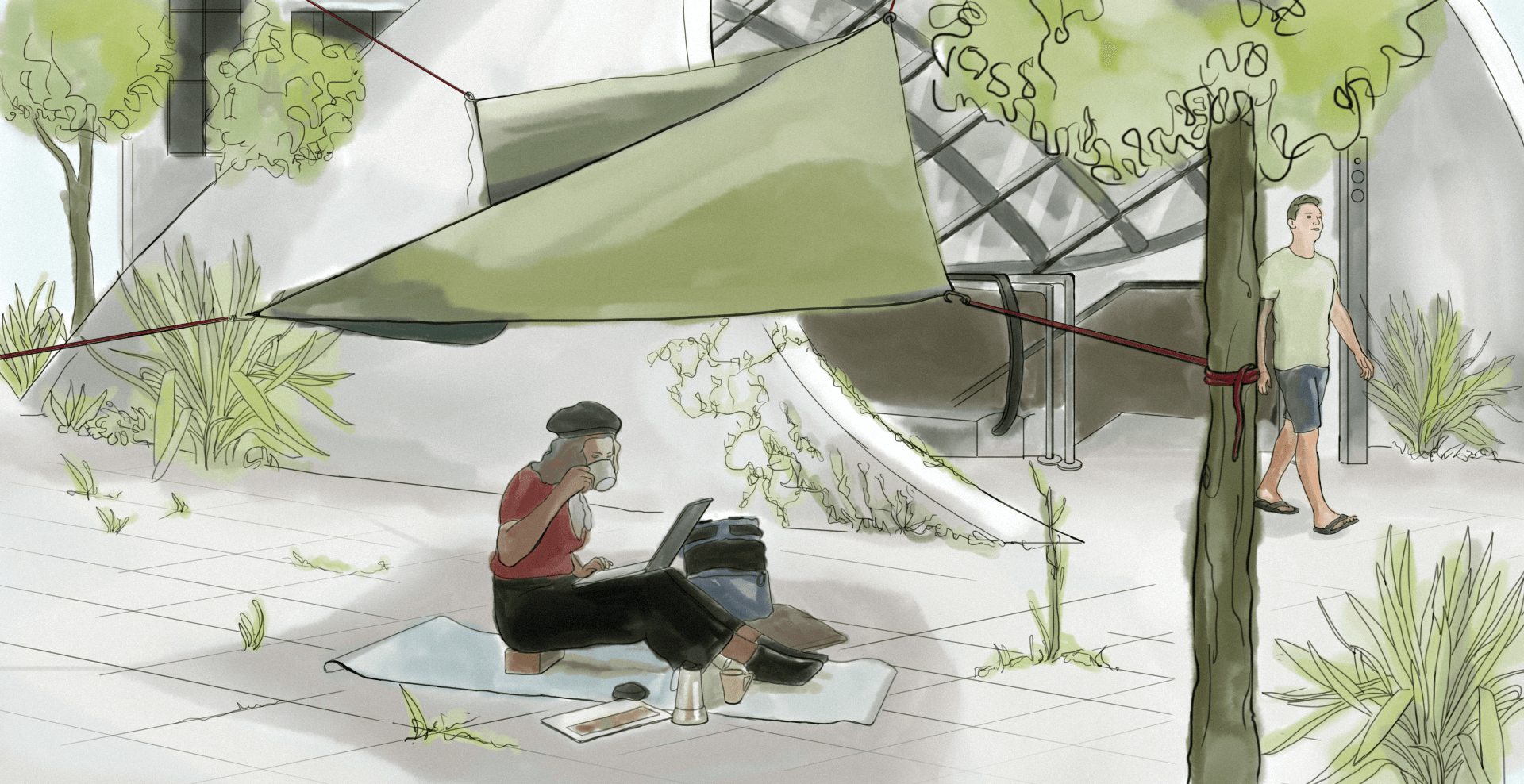Theme leaders: Dr. Lenneke Kuijer, S.C.Kuijer@tue.nl and Sacha Prudon, s.a.c.prudon@tue.nl
Header image: UrbiCamp—image by Shams Hazim; concept owners Piet de Koning, Tjeu van Bussel, and Nina Boelsums.
Background
In this topic you will be exploring implications and opportunities for design to challenge consumerism by imagining alternative personas.
The number of technologies normal living ‘requires’ today in Western societies is a multitude of those a century ago. Not only in terms of direct materials – in cooking for example, next to ingredients sourced from all over the world, cooking today involves things like cookers, fridges, ovens, pineapple cutters, blenders, cooking apps, packaging, kitchen cabinets, counters and designated spaces -, but also in terms of the infrastructures enabling the activity; e.g. water mains, electricity networks, factories, shops, trucks, roads and waste infrastructures that weren’t part of it in the past. Similar developments towards higher resource intensity can be seen in many other areas of everyday life, such as cleaning, parenting, personal care, studying, getting around, socializing, etcetera.
Part of this ‘success-story’ of technological innovation lies in the unique capabilities of technologies to perform tasks that humans cannot, or do not want to do. Washing machines take over part of the hard work of laundering (Kuijer, 2019), central heating systems take care of indoor climate management, smartphones remember our schedules and motor vehicles relieve our legs and feet. Once such devices get adopted, life re-organizes itself around the new configuration; with the work of laundering made easier, people started to launder more often, and own more clothes (Schwartz-Cowan, 1976). This process of what Latour (1992) refers to as delegation, thus leads to technological lock-in (Sahakian, 2018). This is beneficial for technology developers, because it secures a steady market for continuously ‘improved’ versions of a growing range of devices, but not necessarily for the planet.
What also happens when human tasks are delegated to technologies, is that more tasks can be performed in parallel. For example, due to the rise of washing machines, dishwashers, microwaves and smartphones, one person can now be doing the laundry, the dishes, the cooking, watch television and socialize with friends at the same time. As such, more ‘living’ (and consumption) can be squeezed into less time.
In parallel, research is showing that these increasingly resource intensive lives aren’t necessarily ‘better’ lives. Beyond a certain point of affluence, the correlation between happiness and levels of consumption breaks off (Millward-Hopkins et al., 2020; Steinberger and Roberts, 2010). What is also increasingly argued is that halting climate change requires radical reductions in consumption levels, or rather, climate change is for big portions of the world population already limiting consumption levels – even below those required for dignified survival (Vita et al. , 2019). Yet, reducing levels of consumption is not easy, in large part because the dominant neoliberal, techno-capitalist paradigm is cleverly geared towards increasing it (e.g. Pirgmaier, 2020).
Zooming in on the role of design in this system, Dahlgren et al. (2021) identify the lead figure of the ‘techno-hedonist persona’ towards whom design activities are dominantly geared. This persona prefers customized, pleasurable aesthetic experiences requiring low effort, and is therefore the ideal ‘user’ for technological innovations.
The specifics
To break this cycle of accumulation and lock-in of technologies in everyday life, this topic asks you to challenge the techno-hedonist persona, for example by exploring alternative future visions, fictions and designs that assume futures in which people are willing and able to learn new skills, and to change their expectations of ‘normal’ living to align with the capacities of our planet and the realities of a changing climate (see also Kuijer 2022). A central question that then arises is: What might this alternative persona and future mean for design practices and their outcomes?
- You are free to choose your own resource intensive practice (cooking, laundering, travelling, showering, etc.) which helps to make the design activity and future context concrete.
- Take this practice and imagine a persona that is opposite to the techno-hedonist persona described in Dahlgren et al.. What would it mean to design for this persona? What kinds of futures emerge for this practice if this kind of persona would become mainstream? What makes this persona feel happy, fulfilled, satisfied in their needs, etc.? And what would it mean for design practices if this persona would become mainstream in your future?
- Turn your alternative future into something that can somehow be experienced by visitors to the course exhibition. Think about prototypes, but also more broadly about things such as future newspaper articles, new habits, different norms and daily schedules. Eventually, the exhibit should also speak to designers and let them experience what difference it could make to imagine a different kind of end-user.
- The experience is intended to be something that visitors to the Researching the Future Everyday exhibition on 11 June 2024 can take part in. You can plan this as an exhibit that people visit in their own way, a kind of timeslip into the future, a curated experience with a particular time slot, an activity, or a performance. You can choose to invite specific people to take part, if there’s an audience who would be most relevant for you.
- As a group, you will also create a short “catalogue” article about your project (online and print), along with a full research article.
- Individually, you will do a blog post during the project exploring your approach, and a short reflection at the end, focusing on how you think about the future as a designer
- See the syllabus for full details of the assignments
To read/watch/listen
- A talk for EHV Innovation Café in which I present an exercise of challenging the techno-hedonist persona in the context of summer comfort: https://www.youtube.com/watch?v=_Vn9RhoQr_Q (start at 8:00 minutes).
- Dahlgren, Kari, et al. “Personalization and the Smart Home: questioning techno-hedonist imaginaries.” Convergence 27.5 (2021): 1155-1169.
- Kuijer, Lenneke. “Extending possible futures of summer comfort in Dutch households: Phase 2 report’ Anticipating the role of smart technologies in the dynamics of everyday life’.” (2022). https://research.tue.nl/en/publications/extending-possible-futures-of-summer-comfort-in-dutch-households-
- Evenement ‘Ontwerpen voor een duurzaam dagelijks leven’ [in Dutch] on 26 April 2024, 14:30-18:00. More info and a link for registration: https://lennekekuijer.org/2024/02/12/evenement-ontwerpen-voor-een-duurzaam-dagelijks-leven/
References
- Dahlgren, Kari, et al. “Personalization and the Smart Home: questioning techno-hedonist imaginaries.” Convergence 27.5 (2021): 1155-1169.
- Kuijer, Lenneke. “Automated artefacts as co-performers of social practices: washing machines, laundering and design.” Social Practices and Dynamic Non-Humans. Palgrave Macmillan, Cham, 2019. 193-214. https://link.springer.com/chapter/10.1007/978-3-319-92189-1_10
- Kuijer, Lenneke. “Extending possible futures of summer comfort in Dutch households: Phase 2 report’ Anticipating the role of smart technologies in the dynamics of everyday life’.” (2022). https://research.tue.nl/en/publications/extending-possible-futures-of-summer-comfort-in-dutch-households-
- Latour, Bruno. “Where are the missing masses? The sociology of a few mundane artifacts.” Shaping technology/building society: Studies in sociotechnical change 1 (1992): 225-258.
- Millward-Hopkins, J.; Steinberger, J. K.; Rao, N. D.; Oswald, Y. Providing decent living with minimum energy : A global scenario. Global Environ. Change 2020, 65, 102168.
- Pirgmaier, Elke. “Consumption corridors, capitalism and social change.” Sustainability: Science, Practice and Policy 16.1 (2020): 274-285.
- Sahakian, Marlyne. “Constructing normality through material and social lock-in: The dynamics of energy consumption among Geneva’s more affluent households.” Demanding energy. Palgrave Macmillan, Cham, 2018. 51-71.
- Schwartz Cowan, Ruth. 1976. “The “Industrial Revolution” in the Home: Household Technology and Social Change in the 20th Century.” Technology and Culture 17 (1):1-23.
- Vita, G.; Hertwich, E. G.; Stadler, K.; Wood, R. Connecting global emissions to fundamental human needs and their satisfaction. Environ. Res. Lett. 2019, 14, No. 014002.



Comments
2 responses to “2024 Theme 3: Challenging consumerism by design”
[…] Introduction to the three themes (1: The Cabinet of Rarities 2050; 2: Disputing Automated Decisions in the Future Home; 3: Challenging consumerism by design) […]
[…] Lenneke. (2024, 23 April). 2024 Theme 3: Challenging consumerism by design – TU/e Researching the Future Everyday. https://rtfe.imaginari.es/2024/04/23/theme3-2/ […]